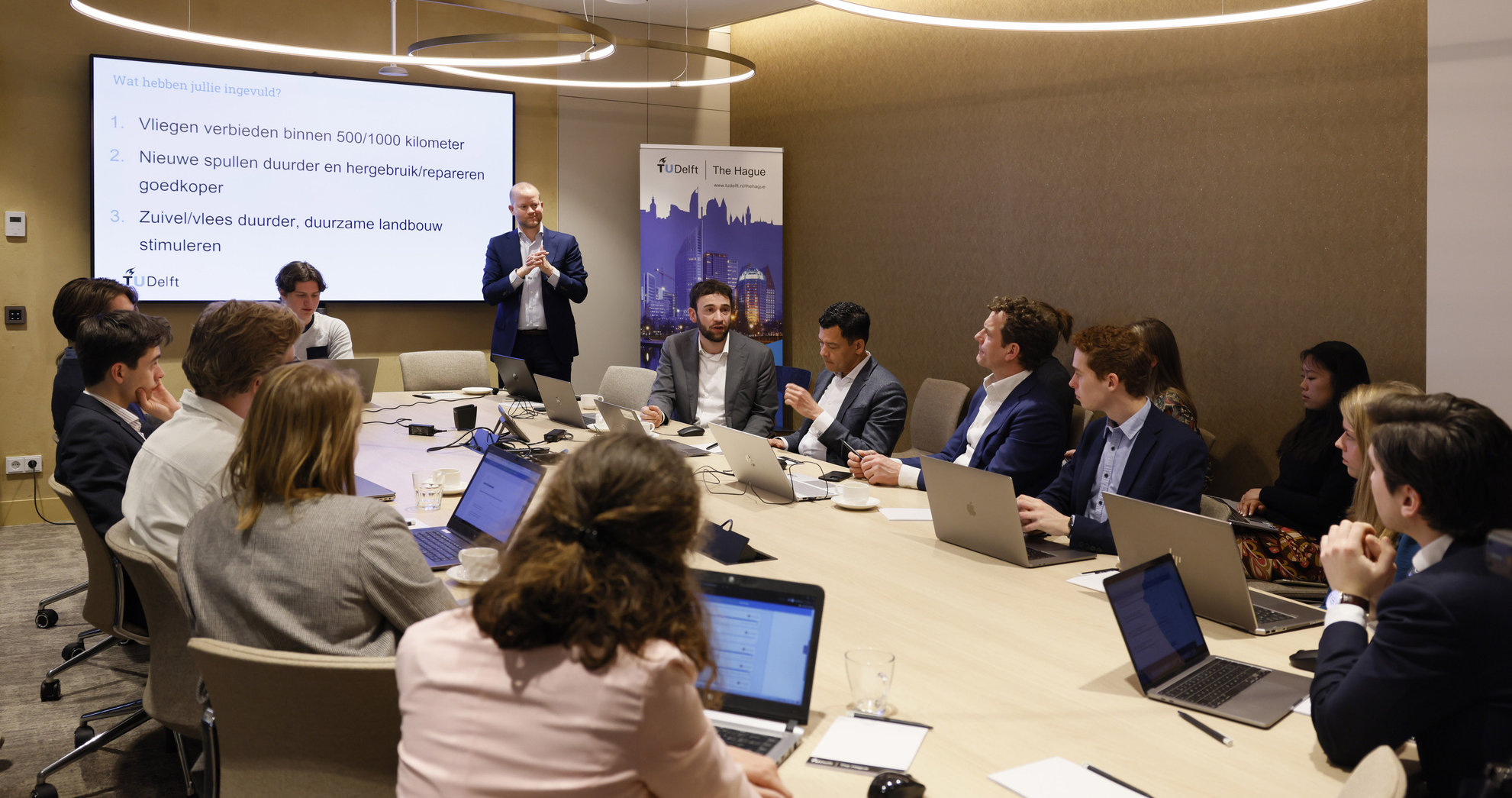Researchers hand over final report Climate Consultation
TU Delft’s methodology brings citizens and politics closer together
Should we ban short flights and improve international rail travel? Adjusting pricing to encourage repairing over purchasing new items? Should the Netherlands opt for the purchase of foreign hydrogen, or should it pursue the construction of small-scale nuclear power plants? In the 2023 Climate Consultation, conducted by Populytics and researchers from TU Delft, over 11,000 Dutch citizens shared their views on various pressing issues. Niek Mouter, associate professor at TU Delft, says: "People are more likely to understand certain policy choices if they see that policies will benefit future generations."
Engaging society with innovative method
On October 25, 2023, the researchers presented their final report to the committee Economic Affairs and Climate of the House of Representatives. The goal is to encourage as many individuals as possible from the broader society to share their perspectives on climate policy. The results will assist Members of Parliament in better evaluating government climate policies and refining their own policy ideas. The consultation utilized the Participatory Value Evaluation (PWE) method and involved 3,000 participants from a selected group that represents the Dutch adult population, along with input from more than 8,000 residents in an open consultation.
Outspoken opinion
The climate consultation reveals that approximately 20% of the Dutch population holds strong opinions on climate policy. This group comprises staunch opponents who reject any additional climate policy and ardent supporters who believe that climate policy cannot be ambitious enough. The larger majority, which constitutes about 80% of the population, favors taxation measures aimed at reducing unsustainable consumption by around 25%. The additional tax revenue would then be allocated to enhancing the appeal of sustainable alternatives.
Discourage air travel
A striking outcome of the Climate Consultation is the substantial portion of the population advocating for measures that discourage air travel and promote train transportation. Participants are suggesting an increase in taxes on flights to the extent that it would reduce Dutch air travel by 30%, with the resulting tax revenue earmarked to lower international train travel costs.
On average, participants recommend a ban on flights covering distances up to 620 kilometers. This would entail the discontinuation of flights from the Netherlands to destinations like Brussels, London, and Paris, for instance. Notably, voters from nearly all political parties endorse these proposals. In addition to this, participants also propose raising taxes on new products while simultaneously incentivizing repair by offering subsidies. Furthermore, they suggest imposing higher taxes on clothing made from new materials, with the revenue dedicated to making clothing crafted from recycled materials more affordable.
Energy Independence
In the Climate Consultation, participants had the opportunity to voice their opinions regarding the governmental decisions aimed at ensuring a sufficient energy supply for Dutch households and businesses in the future. They stress the importance of the Netherlands generating approximately 80% of its energy domestically, thereby reducing dependence on foreign energy sources. Participants strongly advocate for the implementation of strategies such as ‘Reusing industrial heat for residential heating’ and ‘Harnessing geothermal heat for residential heating’ due to their significance, especially in light of high gas prices. The installation of wind turbines in the North Sea garners enthusiastic support among participants, who view it as an effective and environmentally friendly energy source with minimal drawbacks.
There is moderate support for both small and large nuclear power plants, with men more inclined towards nuclear energy than women. Individuals who harbor doubts about climate change find nuclear energy more appealing than those deeply concerned about climate change. This preference is partly attributed to their desire for minimal personal disruption due to climate policies and their expectations of limited impact from nuclear power plants.
Niek Mouter notes, “We can observe from participants' responses that the significance of energy self-reliance has grown in the wake of COVID-19 and the conflict in Ukraine.”
Satisfaction Among Participants
This is the first time the House of Representatives has commissioned a PWE consultation. The members sought to gain experience with this democratic innovation through this first application. On average, participants rate the consultation at 7.2. A significant majority of participants express increased confidence in government decisions when residents are regularly given opportunities to engage in this manner. More than 75% of participants believe that this approach should be employed more frequently to involve residents in government policymaking.
More information and contact
TU Delft researcher: Niek Mouter, n.mouter@tudelft.nl
TU Delft press officer Climate & Energy: Floris den Broeder, f.denbroeder@tudelft.nl, 0645207074
